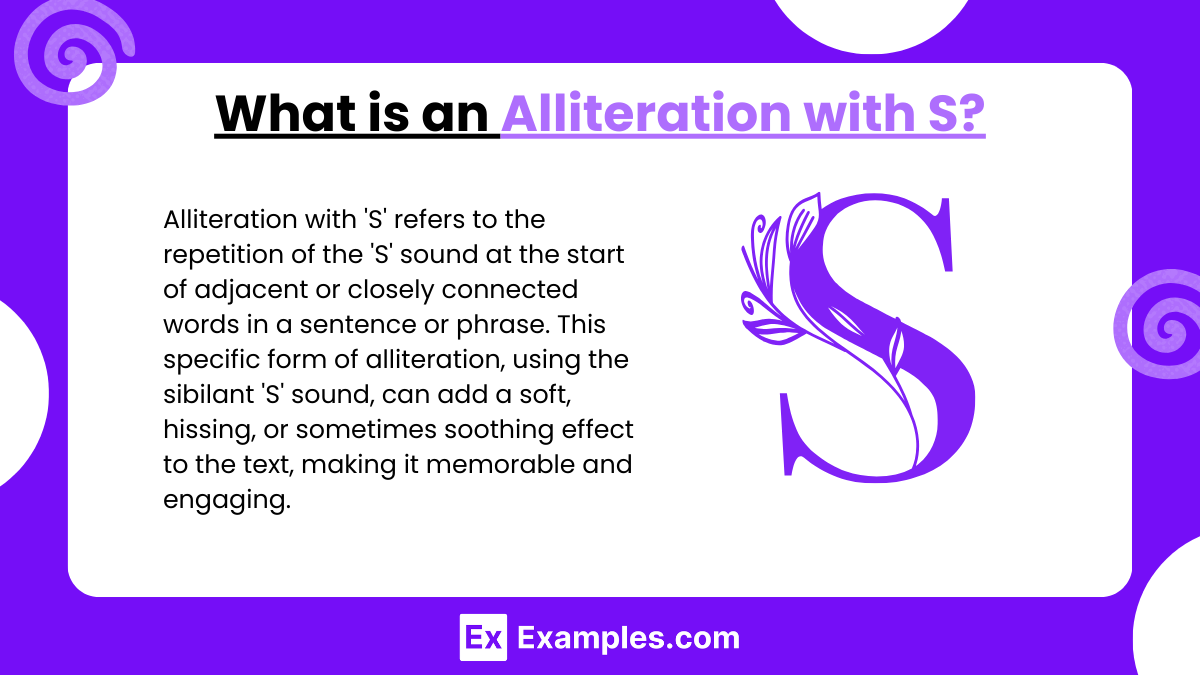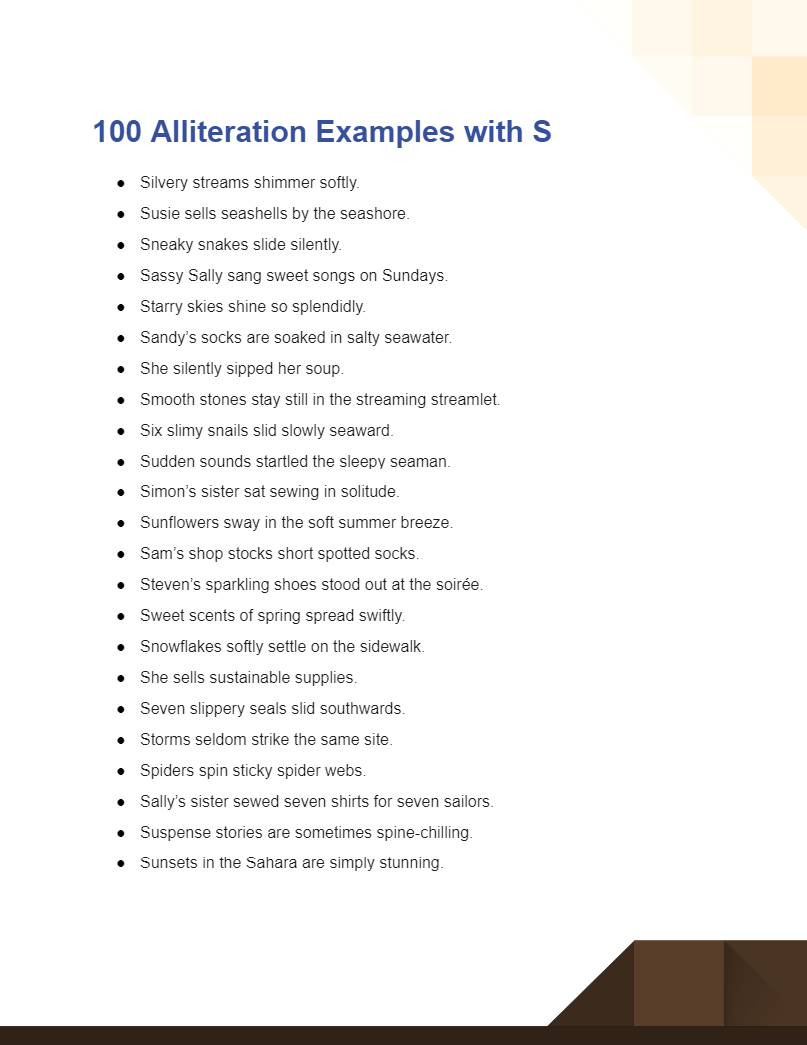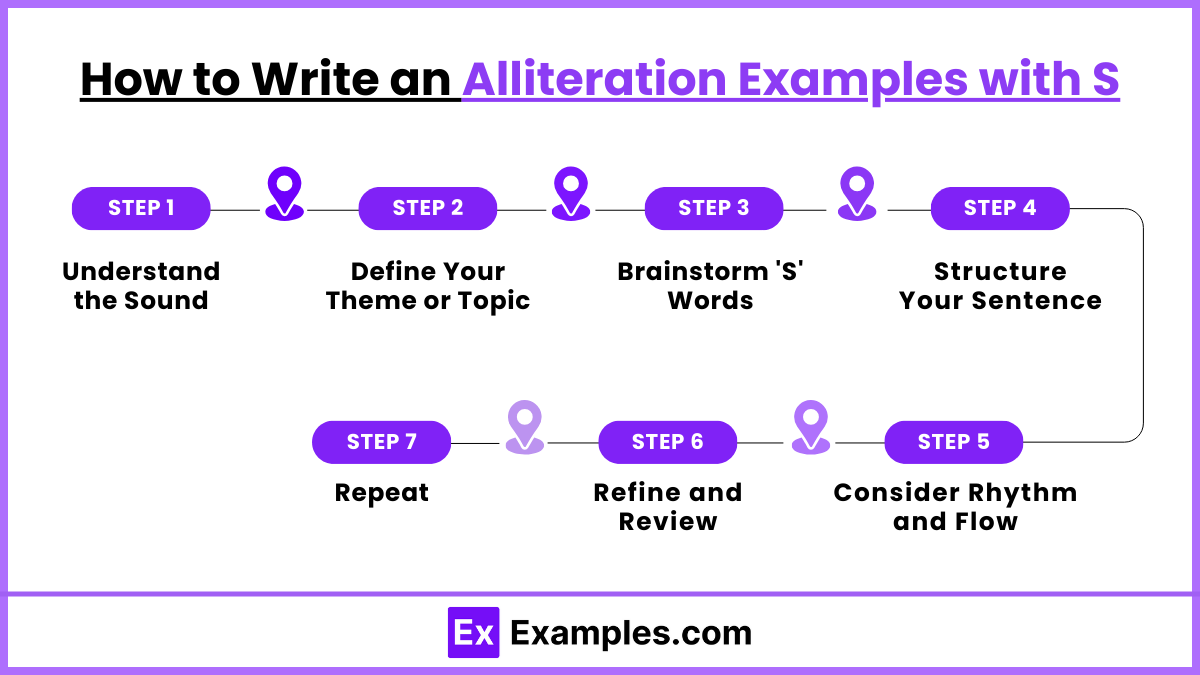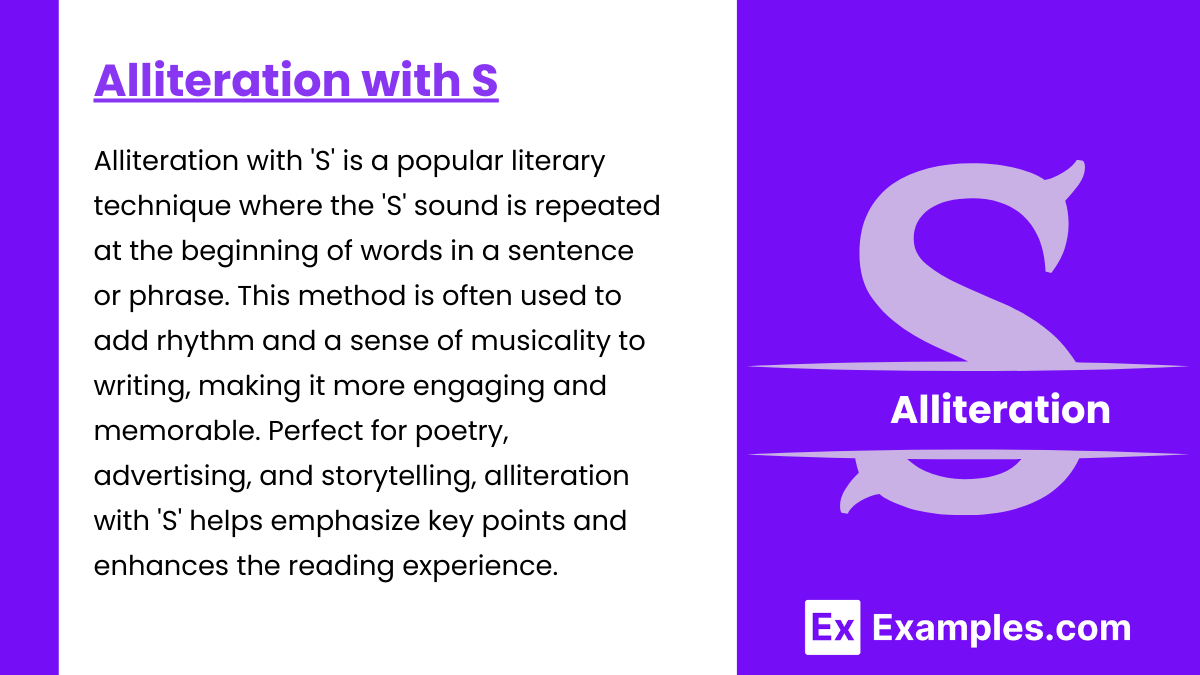99+ Alliteration with S Examples
Alliteration with ‘S’ is a popular literary technique where the ‘S’ sound is repeated at the beginning of words in a sentence or phrase. This method is often used to add rhythm and a sense of musicality to writing, making it more engaging and memorable. Perfect for poetry, advertising, and storytelling, alliteration with ‘S’ helps emphasize key points and enhances the reading experience. Whether in classic literature or modern marketing, this stylistic device captivates audiences and brings texts to life.
What is an Alliteration with S?

100 Alliteration Examples with S

Alliteration with ‘S’ accentuates the sibilant sound, making the text sonorous and striking. This technique, commonly employed in poetry and prose, enhances rhythm and can evoke a variety of moods – from the soothing rustle of leaves to the sinister hiss of a snake. Dive into these alliteration examples in poems to discover the diverse dynamics of ‘S’ alliteration.
- Silvery streams shimmer softly.
- Susie sells seashells by the seashore.
- Sneaky snakes slide silently.
- Sassy Sally sang sweet songs on Sundays.
- Starry skies shine so splendidly.
- Sandy’s socks are soaked in salty seawater.
- She silently sipped her soup.
- Smooth stones stay still in the streaming streamlet.
- Six slimy snails slid slowly seaward.
- Sudden sounds startled the sleepy seaman.
- Simon’s sister sat sewing in solitude.
- Sunflowers sway in the soft summer breeze.
- Sam’s shop stocks short spotted socks.
- Steven’s sparkling shoes stood out at the soirée.
- Sweet scents of spring spread swiftly.
- Snowflakes softly settle on the sidewalk.
- She sells sustainable supplies.
- Seven slippery seals slid southwards.
- Storms seldom strike the same site.
- Spiders spin sticky spiderwebs.
- Sally’s sister sewed seven shirts for seven sailors.
- Suspense stories are sometimes spine-chilling.
- Sunsets in the Sahara are simply stunning.
- Spoons should not scratch non-stick saucepans.
- She swiftly shifted her suitcase sideways.
- Sam saw seven swift sparrows.
- Sarah’s seven sisters slept soundly in sand.
- Silver serpents looked sleek and slippery.
- Sweet strawberries start to sizzle in summer.
- Sandy surfaces seem solid, sometimes slippery.
- Schools of salmon swim seawards.
- She sharpened several shiny swords.
- Short stories should sound stimulating.
- Stella’s scarf stayed soaked in the snow.
- Sweet smiles spread sunshine.
- Silken sheets feel so smooth.
- Slow and steady wins the race.
- Salty sea breeze soothed her senses.
- Some smoky sausages sizzled on the stove.
- Sam’s sassy cat sat on the windowsill.
- Steven sought seven sparkling stones.
- Serenading singers sounded so soulful.
- Softly singing, she soothed the sobbing child.
- Strange statues stood silently, showcasing stories.
- Susie’s soup simmered slowly on the stove.
- Smart solutions simplify stressful situations.
- Sally’s shoes shine so splendidly.
- Stirring stories spark strong sentiments.
- Sunlit seas seem so serene.
- Spicy sauces should be stirred steadily.
- Sally’s songs spread smiles swiftly.
- Silly Sally swiftly shooed seven silly sheep.
- Suspenseful soundtracks send shivers.
- Silverware should shine spotlessly.
- Silently sitting, she saw the sunrise.
- Simple sentences sometimes speak strongest.
- Sunshine spreads serenity on Sunday mornings.
- Sticky sweets stay stuck to surfaces.
- Several ships sailed the silent sea.
- Soothing songs serenaded sleepless souls.
- Skipping stones, Sam sighed silently.
- Snacking on salted sunflower seeds is satisfying.
- Slithering snakes seek shaded spots.
- Sweetly scented summer roses shine.
- Sweaters should stay snugly soft.
- Snow silently settled on sleepy streets.
- Shortbread should be slightly sweet.
- She said she should sit.
- Such splendid sunrises signal spring.
- Sweet sapphire skies spanned the sea.
- Students should study systematically.
- Sneakers should support soles snugly.
- Soft snowflakes silently settled on surfaces.
- Shadows shifted silently on the sidewalk.
- Summer’s sun scorched sandy shores.
- Snuggly scarves shield from sharp shivers.
- Shiny stars sparkle in the silent sky.
- Sophie sews shirts on Sundays.
- Silvery salmon swiftly swim upstream.
- Sweeping storms send ships seaward.
- Small sparrows sing sweetly at sunrise.
- Searching, she spotted scattered seashells.
- Scenic sights soothe stressed spirits.
- She sells stylish summer sandals.
- Slow snails slide on slimy seaweed.
- Sometimes, silence speaks stronger than speech.
- Salty snacks should be savored slowly.
- Shivering, she sought some shelter.
- Superheroes should show some subtlety.
- Sipping soda, she saw a sunset.
- Softly, she sang soulful sonnets.
- Stars shine stronger on silent nights.
- Softly spoken sentences sound so soothing.
- Silly stories spread smiles swiftly.
- Soothing spa sessions satisfy the senses.
- Sticky situations should be solved swiftly.
- Snowy summits shine so splendidly.
- Stirring soups, Susan sighed softly.
- Spacious skies seem so spectacular.
- She selected several summer skirts.
Alliteration Sentence Examples with ‘S’
Alliteration sentence examples with ‘S’ often create a soft or sibilant sound, adding a smooth, sometimes soothing rhythm to the text. This type of alliteration is prevalent in various literary forms, including alliteration in poems, songs, and movies, where it adds a lyrical or dramatic quality. Here are three examples:
- “Sarah’s seven silver swans swam serenely in the sunlit stream.”
- “Simon’s small sailboat skimmed swiftly across the sparkling sea.”
- “Sylvia’s sunflowers stood tall in the sultry summer sun, spreading splendor.”
Alliteration Examples with ‘S’ Words
Alliteration examples using ‘S’ words demonstrate the effectiveness of this consonant in creating vivid, memorable phrases. Often utilized in alliteration in songs, the ‘S’ sound adds a rhythmic, engaging element. Here are three examples:
- “Silent shadows slipped slowly across the stone floor.”
- “The starry sky sparkled splendidly above the sleepy town.”
- “Sweet scents of springtime saturated the serene scenery.”
Alliteration Examples with ‘S’ Name
Incorporating names that start with ‘S’ in alliteration adds a personal and often endearing touch to phrases, making them more relatable and vivid. Here are three examples:
- “Samantha’s sparkling sapphire earrings shone splendidly.”
- “Steven’s speedy scooter swerved skillfully around the sharp corner.”
- “Sandy’s small shop sells sweet strawberry smoothies.”
Alliteration Examples with ‘S’ Sound
The ‘S’ sound in alliteration can create effects ranging from soft and whispery to sharp and striking. These examples show diverse applications of the ‘S’ sound in alliterative structures. Here are three examples:
- “Swift sparrows soared skyward, singing sweet songs.”
- “Silvery stars shimmered in the silent, solemn night.”
- “Suspicious whispers spread swiftly among the startled crowd.”
Alliteration Poems with ‘S’
An alliteration poem with ‘S’ uses the repetitive ‘S’ sound to create a rhythmic and engaging poetic experience. Alliteration in poems, especially with the ‘S’ sound, brings a unique lyrical quality. Here are three examples:
- “Softly, so softly, the stream sings, / Slipping through stones, its sound brings.”
- “Stars scatter their silver light, / Spreading serenity through the night.”
- “Spring’s sprightly spirit spreads, / Spawning splendor in flower beds.”
Alliteration Beginning with ‘S’
Alliteration beginning with ‘S’ sets a specific tone and rhythm in a phrase, often creating a memorable and impactful auditory experience. Found in various artistic expressions, including alliteration in movies, it adds a distinctive flair. Here are three examples:
- “Sophie’s seashells shimmered on the sandy shore.”
- “Stuart’s stirring speech sparked spontaneous applause.”
- “The snake slithered silently across the smooth stones.”
How to Write an Alliteration Examples with S

Step 1: Understand the Sound Alliteration revolves around the repetition of sounds, not just letters. For ‘S’, this typically means a soft “ss” sound, as in “sand” or “sing.”
Step 2: Define Your Theme or Topic If you’re trying to describe a beach scene, you might think of words like “sand,” “sun,” “sea,” “shells,” and “surf.”
Step 3: Brainstorm ‘S’ Words Write down as many ‘S’ words as you can think of. Don’t worry about making sense at this stage. Words like “sweet,” “sour,” “serene,” “stormy,” and “sultry” can be your starting points.
Step 4: Structure Your Sentence Start forming a sentence using the ‘S’ words you’ve listed. Aim to use words that make the sentence coherent and paint a vivid picture.
Step 5: Consider Rhythm and Flow Alliteration is not just about repetition but also rhythm. Read your sentence aloud. Does it roll off the tongue? Adjust if necessary.
Step 6: Refine and Review Ensure your sentence is not just a collection of ‘S’ words but offers meaningful content. “Soft sand soothes sore soles” provides both imagery and a sense of comfort.
Step 7: Repeat Practice makes perfect. The more you try, the more naturally alliterative sentences will come to you.
Tips for Writing an Alliteration Examples with S
Here are the Tips for Writing an Alliteration Examples with ‘S’:
- Use Descriptive ‘S’ Words: Words like “silvery,” “shimmering,” and “serene” can create vivid imagery in the reader’s mind.
- Mix and Match Words: Combine different ‘S’ words from your brainstorming list to see which fit best together.
- Don’t Overdo It: While alliteration is a powerful tool, it can be overwhelming if every word in your sentence begins with ‘S’. Aim for balance.
- Read Aloud: The beauty of alliteration often lies in its auditory appeal. Always read your alliterations aloud to see if they have the desired rhythmic effect.
- Vary Word Lengths: Using a mix of short and long ‘S’ words can make your alliteration more dynamic. For example, “stars shine silently” has a different rhythm than “silvery stars shimmer silently.”
- Seek Feedback: Share your alliterations with friends or colleagues. Fresh ears can offer valuable feedback and maybe even some additional ‘S’ word suggestions.
- Use a Thesaurus: If you’re struggling to find the right ‘S’ word, a thesaurus can be invaluable. Look up synonyms for words that might fit your theme.
- Keep Practicing: The more you write and experiment with alliteration, the more natural and intuitive it will become.
With these steps and tips, you’re well on your way to crafting impactful alliteration for first grade with the letter ‘S’. Remember, the key is to create a balance between sound repetition, meaning, and rhythm.
FAQs
Can you give an example of alliteration with ‘S’?
A common example is “She sells sea shells by the sea shore,” where the ‘S’ sound is prominently repeated.
Why is alliteration with ‘S’ used in writing?
Alliteration with ‘S’ is used to create rhythm, enhance mood, or emphasize certain points in both poetry and prose.
How does alliteration with ‘S’ affect readability?
Alliteration with ‘S’ can make text more memorable and engaging, potentially improving readability and listener retention.
What types of writing benefit most from alliteration with ‘S’?
Poetry, speeches, and advertising copy often benefit from alliteration with ‘S’ as it adds musicality and can make language more persuasive.
Are there any rules for using alliteration with ‘S’ in writing?
The main rule is to use it sparingly to avoid overwhelming the reader and to maintain the impact and effectiveness of the alliteration.


